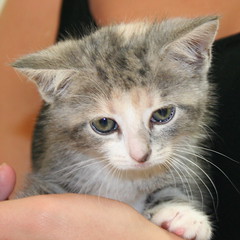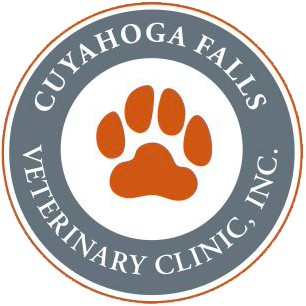We love taking care of puppies and kittens in the early weeks and months of life! They so cute, so playful and despite the occasional trouble they get into, the pleasure they bring into our homes is immeasurable. It’s so important to make sure they’re as healthy as they can be and to make sure they’re protected against worrisome and life-threatening diseases that are so preventable. That’s why we set up a vaccine series and protocol for puppies and kittens, so we can guide them through the early stages of life (and beyond) by reducing or eliminating the risk of dangerous, contagious diseases.
We’ve welcomed the thoughts of Ernie Ward, DVM, to our blog before, and he’s got some good things to share about vaccines. The following is taken from his article, Vaccination Nation, that appeared in volume 6 of fetch! magazine. In part one, we’ll cover kittens. Here goes!
vaccination nation: Are we over-vaccinating our pets?
by dr. ernie ward
 |
Perhaps no other medical advancement has saved more lives than vaccinations. From the time Edward Jenner discovered a vaccine for smallpox in 1796, the endeavor to prevent disease through vaccination has resulted in scores of diseases being reduced to mere memories. For dogs and cats, once prevalent conditions such as canine distemper, parvovirus and feline panleukopenia are now largely unknown by modern pet owners. Of course with each great advancement comes great responsibility. As the race to create more and more vaccines heated up, some of us began to raise a simple question: Are we over-vaccinating our pets? The past decade has witnessed a tremendous overhaul and rethinking of vaccination strategies from “vaccinate every pet with everything” to “vaccinate every pet with what it needs.” The vaccines your new puppy or kitten needs should be based on the disease risks of where you live, whether your pet will live indoors, outdoors or a combination and how much exposure to other pets they’re likely to encounter. For the past decade I’ve been calling this “individualized care.” Vaccines, diet, exercise and nutritional supplements should be based on each individual’s lifestyle rather than “we’ve got a vaccine” or “here’s a good food.” Medicine has progressed beyond a “one size fits all” approach to “what’s your size?” So let’s get suited up and learn about the vaccines every puppy or kitten should have.
Why All Those Shots?
Before we discuss the individual vaccines, the question many new pet owners have is why does a puppy or kitten need so many? The answer lies within the mother’s first milk or colostrum. Colostrum is secreted during the first few meals just after birth and is a substance rich in protective antibodies from the mother, maternal antibodies. Because a fledgling newborn’s immune system hasn’t had time to mature, the mother confers protection for the first several weeks until the babies can fend for themselves. The problem is we never know how long the maternal antibodies last. In most puppies and kittens these protective proteins may last six to eight weeks while in others they may last up to 14 to 16 weeks.
If you administer a vaccine to a young pet with high numbers of maternal antibodies, these antibodies may interfere with the body’s ability to make its own protection. The trick to successful puppy- and kitten-hood vaccinations is timing. We want to administer a vaccine when the maternal antibodies are low enough to stimulate a response but not so low to put a pet at risk. To accomplish this, we vaccinate every three to four weeks starting at around six weeks of age and ending by about 16 weeks. A typical vaccine schedule for most puppies and kittens will be six, 10 and 14 weeks of age or eight, 12, and 16 weeks. Most pets will be vaccinated again at one year and then every one-to-three years for most diseases.
Vaccines for Every Kitten
Panleukopenia Commonly referred to as “Feline Distemper,” this deadly disease is spread through contaminated bodily fluids, feces, bedding, bowls, and even fleas. The virus is able to survive for up to a year and resists most cleansers and disinfectants. This is one virus you do not want your cat to meet. All kittens should be vaccinated against panleukopenia beginning at about 6 weeks of age and every three to four weeks until 16 weeks.
 |
Feline Herpesvirus-1 Herpesvirus infections in cats cause runny eyes, sneezing and other upper respiratory problems. Humans cannot be infected with feline herpesvirus. Every kitten should be vaccinated against herpesvirus every three to four weeks starting at about six weeks of age.
Calicivirus “Calici” is another common upper respiratory tract infection of cats. Both feline herpes and calicivirus can cause serious eye infections, including painful corneal ulcers. Kittens should begin vaccination against calicivirus at six weeks of age with booster vaccines every three to four weeks until 16 weeks old.
Rabies Cats can be just as “Cujo” as dogs – even more so. More cases of rabies are now reported in cats than dogs in the US. All kittens should be vaccinated against rabies at three to four months of age and then re-vaccinated every one to three years based on your local laws [in Summit County: every three years after a cat’s first annual dose].
Feline Leukemia Virus (FeLV) “Leukemia” is one of the most insidiously deadly diseases of cats. Many cats live for several years with this contagious disease before they show any signs of illness. All kittens should be tested for FeLV during their first vet visit. I recommend all kittens be vaccinated against FeLV at eight to 12 weeks of age, regardless of lifestyle. A single booster three to four weeks later is enough to protect your purr-ball. Because young kittens are most susceptible to FeLV, this is one I don’t believe you should skip. After your kitty is one year old, you don’t need to vaccinate unless your cat is at risk of exposure.
Vaccines for Some Kittens
Feline Immunodeficiency Virus (FIV) Sometimes incorrectly referred to as “Feline AIDS,” this is another fatal infection that all kittens should be tested for during the first doctor’s visit. If your kitten is at high-risk of being exposed to infected cats, you may want to discuss FIV vaccination with your vet. The vaccine protects against some, but not all, FIV strains. One of the biggest drawbacks is that vaccinated cats test positive on the FIV test, making it nearly impossible to diagnose the condition later. FIV vaccination starts at eight weeks of agrequires two boosters two to three weeks apart.
Chlamydophila felis “Chlamydia” is a bacterium that causes upper respiratory tract infections in cats. Humans cannot get chlamydia from cats. If you have many cats in your household, this may be a vaccine to consider. Kittens age nine weeks or older may be vaccinated with a second vaccine given three to four weeks later.
 |
Bordetella bronchiseptica This is “kennel cough” for cats. While not a popular vaccine, if your house-hold has experienced kennel cough, you should consider vaccination. A single dose at eight weeks of age protects your kitten for a year.
Vaccines your kitten can skip
At least two common kitten vaccines are no longer generally recommended. These include feline infectious peritonitis (FIP) and feline Giardia vaccine.
Vaccines play an important role in keeping your newest family member safe and healthy. The great news is that veterinarians and pet owners are recognizing that each individual pet should be treated as such – individually. Don’t be afraid to ask why your pet’s doctor is recommending a vaccine, test or treatment. Good veterinarians welcome your interest and are always eager to explain. Avoid “vaccinating for vaccination’s sake” and insist that your pet only receive “what it needs, when it needs it.” By working closely with your veterinarian, you can ensure your new addition starts life in a healthy direction.
Written by Dr. Ernie Ward
Originally written for fetch! magazine, a Petplan pet insurance magazine. Learn more about Petplan at www.gopetplan.com
Reproduced with permission from the author and editor.
We want to thank Dr. Ward for helping us communicate the importance of vaccines to a kitten’s (and a cat’s!) life. To summarize, we stand side-by-side with Dr. Ward in suggesting that your puppy receive “what it needs, when it needs it.” If you’ve just brought a kitten into your home and life, give us a call at 330-929-3223 so we can help your kitten get started on a long, happy, healthy life with you.


The Cuyahoga Falls Veterinary Clinic | Animal Wellness | Medical Services | Pet Services
[…] Nation, that appeared in volume 6 of fetch! magazine. In part two, we’ll cover puppies (kittens were in part one). Here […]